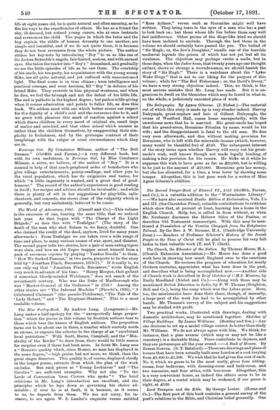The Blue Poetry - Book. By Andrew Lang. (Longmans.)—Mr. Lang makes a
half-apology for the " unexpectedly large propor- tion " which the pieces in this volume by Scottish authors bear to those which bear the names of English authors. The proportion turns out to be about one in three, a number which scarcely needs an excuse, or exposes the selector to the charge of an " exorbitant local patriotism." With Scott, Burns, Campbell, and the " Min- strelsy of the Border" to draw from, there would be little reason for surprise even if there had been more. In Scott Mr. Lang sees a " Homeric quality which, since Homer, no man has displayed in the same degree,"—high praise, but not more, we think, than the great singer deserves. This quality is, of course, displayed chiefly in the longer poems, extracts from which the plan of the work excludes. But such pieces as " Young Lochinvar " and " The Cavalier" are sufficient examples. Why not also " To the Lords of Convention 'twas Clavers who spoke " ? The brief criticisms in Mr. Lang's introduction are excellent, and the principles which he lays down as governing his choice ad- mirable : if ever he is at fault, it is because, as it seems to us, he departs from them. We are not sorry, for in- stance, to see again W. S. Landor's exquisite verses entitled " Rose Aylmer," verses such as Simonides might well have written. They bring tears to the eyes of a man who has a. past to look back on ; but those whose life lies before them may well feel indifference. Other poems of the dirge-like kind we should have been inclined to exclude. Through the last three in the volume we should certainly have passed the pen. The ballad of "Sir Hugh; or, the Jew's Daughter," recalls one of the horrible mediaeval legends the poison of which has not yet lost all its virulence. The objection may perhaps excite a smile, but in these days, when the Juden-passe, that twenty years ago one thought extinct, shows so strange a recrudescence, we should banish the story of " Sir Hugh." There is a weirdness about the " Lyke- Wake Dirge " that is not to our liking for the purpose of this volume ; while for " The Red Fisherman ; or, the Devil's Decoy," we have a very strong objection indeed. This, we think, is the most serious mistake that Mr. Lang has made. But it is un- gracious to dwell on the blemishes which may be found in what is, on the whole, a judiciously executed piece of work.


































 Previous page
Previous page